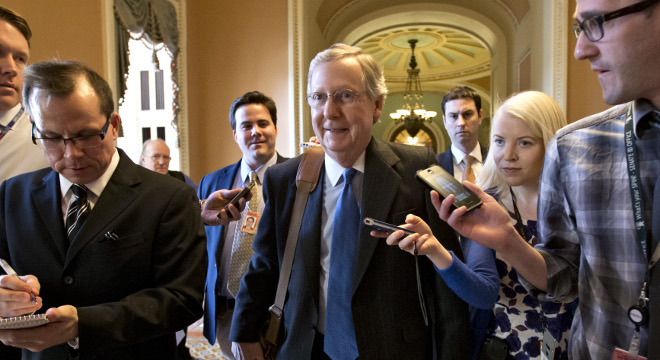The final details of the deal struck by Senate Majority Leader Harry Reid (D-NV) and Minority Leader Mitch McConnell (R-KY), which make only minor changes to the filibuster rules in the Senate, show why leading reformers are so disappointed in the outcome.
The agreement, which was finalized Thursday morning, is far more scaled back than what reformers like Sen. Jeff Merkley (D-OR) and Tom Udall (D-NM) wanted. It does not require filibustering senators to speak on the floor, nor does it shift the burden from a governing majority to an obstructing minority. But it makes changes aimed at speeding up less controversial Senate business.
The language of the two-part rules change package, provided to TPM by Reid’s office, can be read below.
The new rules would permit a Senate majority to bypass the filibuster on a motion to proceed to debate with the condition that either a group of senators on each side of the aisle agrees, or the minority is guaranteed the chance to offer amendments.
The new rules limit debate time for sub-cabinet and district court nominations and reduces the number of required hours between cloture and final confirmation from 30 to two. It also lowers the number of cloture motions required to go to conference with the House.
“This does very little to change how the Senate as a body functions,” said a pro-reform Democratic aide. “After these small changes the Senate will operate much the same way as it did yesterday.”
The deal mirrors the plan that Sens. John McCain (R-AZ) and Carl Levin (D-MI) put forth, with tweaks to address concerns that the minority could more easily add poison pills to bills.
Although others may have preferred more sweeping reforms, “Reid got virtually everything he has said he wanted,” said a Democratic leadership aide, pointing to many remarks from Reid saying he wanted to make the Senate function more efficiently.
The pro-reform Democratic aide scoffed at that claim.
“Reid said he wants to make it easier to move on bills,” the aide told TPM. “This doesn’t do that. He still has to negotiate with McConnell to get on a bill. This is a negligible difference to how the Senate operates today. I don’t see how they can make that argument.”
Outside proponents of reform lamented the Reid-McConnell deal.
“Unfortunately, the incremental ‘reforms” in the agreement do not go nearly far enough to deliver meaningful change,” said Fix The Senate Now, a coalition of groups pushing filibuster reform. The coalition said Democrats have “missed an opportunity to restore accountability and deliberation to the Senate, while not raising the costs of obstruction.”
For Reid, the bipartisan agreement avoids the need to use the constitutional option to change Senate rules with mere 51-vote majority, a move that he threatened to use Wednesday if no deal was reached.






